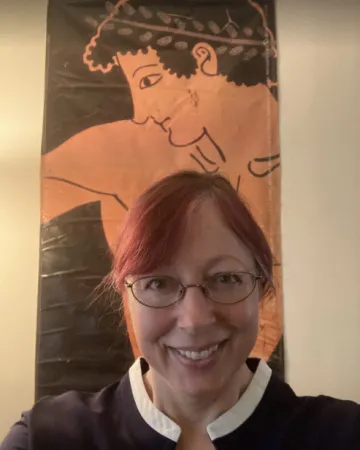
Office Hours:
Office hours 11-12 Tuesday and Thursday FAC 109
and 11-12 M, W, F via zoom. See course syllabus on D2L for zoom link.
Education
- BA, University Of California-Berkeley
- MA, University Of Washington
- MA, Harvard University
- PHD, Harvard University
Art Historian Marina Haworth has been teaching at NHCC since 2013. She teaches the Art History survey courses (Art 1601 and 1602), the Art Appreciation courses (Art 1040), the Museum Field Trip mini-courses (Art 1010 and 1020), and the Architectural History survey course (Art 1650).
She teaches all periods and cultures, and researches and publishes in ancient Greek art and archaeology.
Her PhD is in Classical Archaeology, and her doctoral dissertation title is Desiring Athletes: The Meaning of Athletic Imagery on Red-Figure Athenian Symposium Pottery.
Art History and Art Appreciation at NHCC
Art history is the history of the world, told through images and visual objects. Learn about the visual and material culture of the past and present! Understanding how historical peoples created, used, and appreciated visual art helps to make clear our own assumptions about art, and what possibilities there are yet to explore!
Learn about the material, historical facts, and latest research and interpretative controversies! Find out what issues are still debated today, and what questions to ask of the visual evidence.
Among many other complex cultural issues, learn:
- *What religious beliefs motivated the design of the Egyptian pyramids?
- *Which specific cultural practice led to the development of linear perspective in early 15th century Italy?
- *Which idealistic political beliefs inspired the Mexican muralists of the 20th century?
- *How did historical cultures cross-influence each other to create some of the most well-known and distinctive artworks, visual styles, and monuments known today?
Find out the answers to these questions and much, much more!
Courses Offered:
Art Appreciation (3 credits/Art 1040):
Learn how to read images and understand the methods artists and designers use to get us to think and feel a certain way when we experience visuals across our culture. Bring your critical thinking skills and learn how to apply them to images! Learn the vocabulary that will enable you to translate images into words in order to discuss and analyze and understands visual art.
Art History I (3 credits/Art 1601):
From paleolithic cave paintings, the ziggurats and palaces of the Near East, the temples of ancient Egypt, Greece, and Rome to medieval cathedrals and mosques, this survey course presents ancient art in its cultural context, and explores critically the methods art historians and archaeologists use to deduce information from original artworks while attempting to avoid projecting our own present assumptions onto the ancient material. (Offered Fall semester)
Art History II (3 credits/Art 1602):
This survey course covers the chronology of art from 1400 CE to the present day. This encompasses art movements from the Renaissance to Modernism and Post-Modernism. The art of China, Japan, Korea, Africa, are also introduced. The course continues the processes established in Art History I: close looking at the material, and investigating the artworks in their historical context. (Art History I is not required – all are welcome! Offered Spring semester)
Architectural History (2 credits/Art 1650):
While other courses described here look at some of the architecture of different time periods, such as houses and residential buildings, governmental, civic buildings and palaces, as well as religious spaces and structures, this two-credit course focuses exclusively on the visuals of architectural spaces. Learn about the aesthetics, building techniques, and even political or theological statements architectural structures make! This expansive survey covers world architecture o